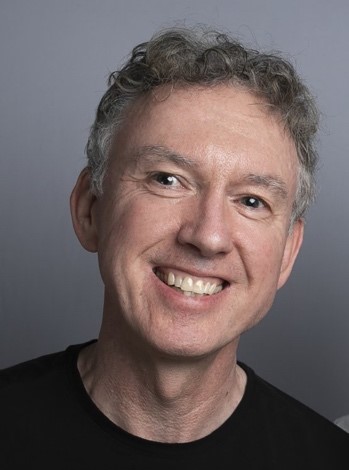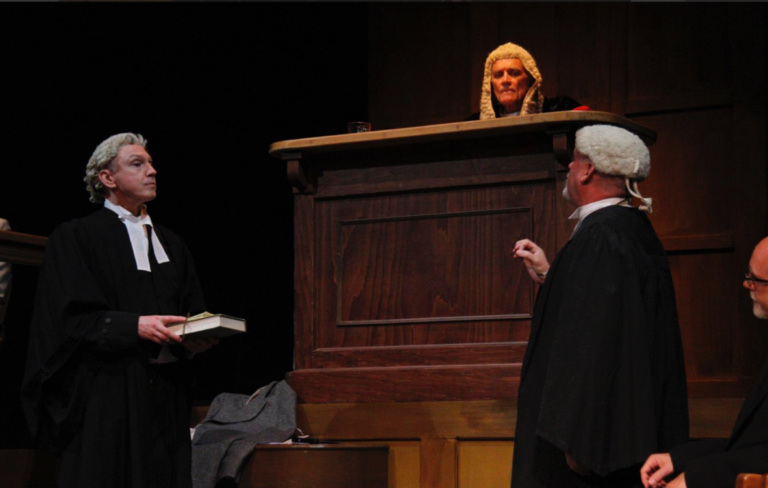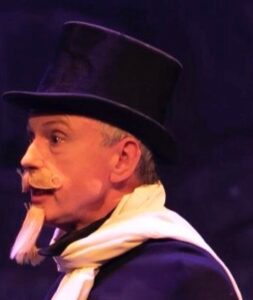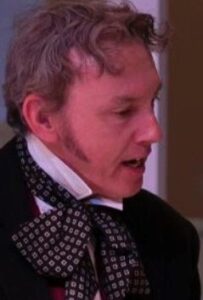
By Guy Newsham and Albert Lightstone
I have worked with Guy for a number of years primarily on the OLT production of Witness for the Prosecution, which had the misfortune of being delayed due to the pandemic, but also on the Season Planning Committee where a group of us read up to 80 plays a year to choose the best nine that will ultimately form an upcoming season. Recently he appeared in Book of Will and we decided to hold off on publishing this blog until now to provide you with some interesting reading in the cold days and evenings waiting for our Christmas show to begin.
Where are you from originally and how did you end up in Ottawa?
I was born and raised in the north of England. I was interested in spending a couple of years abroad after finishing my grad degree. A good friend there was from Canada and on sabbatical from his job at the National Research Council (NRC) in Ottawa, and he suggested I include NRC on my list of possibles. He played the same trick on his future English wife! We’ve all been in Ottawa ever since, and are still very good friends (and OLT audience regulars).
Where did you study and what degree did you get?
I got a Bachelor’s in Physics from the University of St. Andrews in Scotland; I was there a few years before Will and Kate. Then a PhD in Architectural Science from the University of Cambridge in England; I was there a few years after King Charles. This year I sponsored a new 10-minute playwriting competition for students at St. Andrews, and I hope it will become an annual event.
Where did you work? What do you do now? How do you like retirement?
Thirty years at NRC (29 of them at the same desk!), and then very lucky to take “Freedom 55”. NRC was a great place to work (though not every single day!), and my career focused on making buildings more energy efficient, sustainable and with better indoor environment quality. The first six months of my retirement were in the depths of the pandemic, so that wasn’t the best, but once things opened up I got to work on filling my calendar. I volunteer two full days per week at a charity kitchen and at the public library. I ride my bike a lot, proudly wearing my OLT cycling jersey, I hit the gym twice a week, and, of course, I spend as much time at the theatre as I can! When I’m not on stage or rehearsing, I’m on the OLT Season Planning and Communication Committees, I mentor novice writers in Kanata Theatre’s 10-minute playwriting program, and I write my own stuff.
For the past two years you have acted in two plays a year. Is that your plan going forward?
I’ve been very fortunate to get cast in show after show recently. I’d love to keep that pace going, but that all depends on what shows are coming up that might suit me, and on being successful at auditions. It’s a weird hobby in that you can never be sure if and when you are going to be able to do it! It can be awkward planning travel or other aspects of life around the future possibility that you might be busy for three months six months from now if a director picks you out of a crowd.
When you act, do you change your accent to different UK dialects? How do you do that?
Grudgingly! I really don’t like to do accents. There are a very limited number I’ll even attempt, and I still feel I’m not very good at them. I’d rather worry about character development than vowel sounds!
Do you ever do an American/Canadian accent?
Whenever I go back to the UK someone will ask me what part of America I’m from, so in that sense “yes”. It seems enough North American influence has crept into my voice, even if everyone here pegs me as unequivocally British. I’ve always thought I might want to work with an accent coach on a North American accent but, so far, the local theatres have programmed enough British plays that I haven’t had to. Actually, I’m a bit of an advocate for casting “accent blind”; after all, isn’t every accent in the world a “Canadian” accent these days?
When the theatre was closed down for two years how did you keep your Witness for The Prosecution role fresh in mind?
I did a scene every day at home for the first few months when it made sense because we might have come back any time, and then I kept on doing a scene a day when it stopped making sense. My method is to record the other characters’ lines and leave gaps for my own, then play the recording back as I map my blocking around my living room, and declaim my lines to the walls – my neighbours must have thought I was going mad! I actually found it comforting to imagine I was in the OLT rehearsal hall, it helped me believe that “normality” would resume some day.
Do you act anywhere else? How does OLT compare to other theatres?
I’ve been on stage once at Kanata Theatre, as Sir Thomas More in A Man For All Seasons, and I’ve also been in a couple of plays at Perth Studio Theatre. Comparisons? I won’t be drawn on that one!
What’s your favourite facial hair for a role?
I grew real sideburns for Sense and Sensibility, which looked great for the period, but felt a little awkward in the grocery store! I enjoyed my characteristic moustache and pointy beard for Sir Edward Dering in Book of Will, and Moriarty in Holmes and Watson, though they were stuck on with tape so there was the constant fear they would come loose.
What would be your dream role; one that you knew you would be qualified to play?
No specific role, but I’d like to try something serious and contemporary for a change, but that genre’s pretty rare in community theatre.
Ever want to direct?
Nope. I have great admiration for the amazingly creative directors I’ve worked with, and I know that there is no way I have the talent (or inclination) to do what they do.
Interested in working behind the scenes?
The committee work and writing for the stage that I do is “behind the scenes” in a sense. But if you mean props, costumes, lighting operator etc. then no; I’m happy to leave that to the fantastic folks who already do those things so well, although I could be tempted into doing a bit of set painting.
See if you’re paying attention to our OLT shows – difference between a barrister and a judge’s wig?
I wasn’t paying attention.
(This was actually a trick question. Although we had a judge and barrister in Witness for the Prosecution, the reference is actually from Around the World in 80 Days which Guy didn’t act in.)

As a playwright, what inspires you to write?
I’ve always felt a compulsion to write. I wrote several short stories and novel-length things in my 20s and 30s, hooked on the idea of being a millionaire best-seller of course! Looking back (I daren’t re-read, haha) I’m sure they were all dreadful, but the valuable lesson I learned was that what I really enjoyed in a novel was writing dialogue, so why not just write dialogue? So now I’m very happy writing plays, especially as I have other ways to pay the bills!
I started writing for the stage in earnest seven years ago, facilitated by a playwriting group that met at OLT on Mondays. Sadly, that group folded about six months after I joined, but it was just enough to get me started and give me confidence.
Ideas can come from anywhere – a podcast, an overheard conversation, a news story – you just have to be open to the possibility, and to write a prompt down before you forget it.
What is the process of writing a play. Do you have the voices of the characters in your head?
I typically have a rough idea of the first few opening lines, and what I think the ending is going to be, for a scene, or for the whole play. From that, I try to set up the characters and let them talk for themselves, and see where they take me. Yes, it’s a bit like seeing them in my head, and then recording their conversation. But it’s a much slower process than natural speech, because the characters start and stop and rewind and self-edit many, many times. Oh, how I wish I could have done that in some of my real-life conversations! And, as the old saying goes “Writing is rewriting”. Getting a very rough first draft on the page is only the very start of the process. I happen to enjoy redrafting and polishing, but some writers absolutely hate it.
What happens when your play is up for review on a season selection committee? How do you remove yourself from the whole selection process.
If you’re referring specifically to the OLT committee then yes, I don’t vote on my own plays. For other theatres, my primary M.O. is to submit to open calls, so I have no role in selection. As with all writing (and much auditioning), you mostly get rejected, but once in a while you get selected, and that makes for a happy day.
How do you handle negative / constructive criticism of your work.
It’s always tough, but I’ve learned that all input helps the final product. You’re never obliged to make the changes a critic, reviewer, workshopper, or dramaturg suggests, but considering what they’ve said often leads to new insights of your own.
How many plays do you write a year? How long does it take to write one?
My participation in playwriting groups would suggest that I’m relatively prolific, but I always feel I haven’t done enough. This year I’ve polished a full-length play, written a new one-act from scratch, two new 10-minute plays, and three new 1-minute plays (yes, there is such a thing, for very short attention spans!). I started out with 10-minute plays, which impose a very useful discipline on a writer. You still have to have a beginning, middle and end, character development, and challenges to overcome, and you have to use words very efficiently. I can write the first draft of a 10-minute play in a long weekend, but several weeks of polishing will then follow.
Have your plays ever been performed? How do you get them published?
To date I’ve had, or booked, 78 productions of various types in five countries. These are mostly 10-minute plays, with a few one-acts and full-lengths too. I don’t self-produce, so these are usually open calls where my script is “in competition” with hundreds of others for a very small number of festival slots. Some festivals publish collections of the winning plays, so I do now have some slim volumes on my bookshelves that feature my writing, but you probably can’t find them on Amazon!
Working on anything interesting now?
I just finished a new 10-minute play. After several plays in the drama or dramedy realm, I thought I needed a new, purely silly comedy; it’s called I Gotta Go! Next up I have in mind a longer piece, working title Buried, prompted by an Economist podcast I heard at the gym on the world of commercial dinosaur digging. But who knows, maybe another idea will come along to usurp that one.
I understand that you a fabulous baker. Examples? Most fabulous product?
I’m a competent baker, who took some short courses, learned a few basic techniques and can follow a recipe. I have a few favourites that seem to go down well in the rehearsal hall and Green Room, one example is Caramel Cinnamon Buns:

Thank you so much for your time, Guy.
Guy is too modest to mention that his play Last Rites was the winner of the OLT’s 2022 National One-Act Playwriting Competition. The OLT then produced it as our entry into the 2022 EODL One-Act Festival where it won Best Director (Ian Gillies) and Best Actor (Stavros Sakiadis). This year, Theatre Night in Merrickville chose his play Making Friends as their entry into the 2023 EODL Festival, where it won Best Actor.
For full transparency, I have read several of Guy’s plays for the OLT’s Playwriting Competition (NB, all plays are submitted under assumed names so I didn’t know they were his) and our own Season Planning Committee. I have never been offered any of his baked goods to influence my vote. I would however not decline any baked goods provided outside of these selection periods. Just a gentle hint, Guy.


